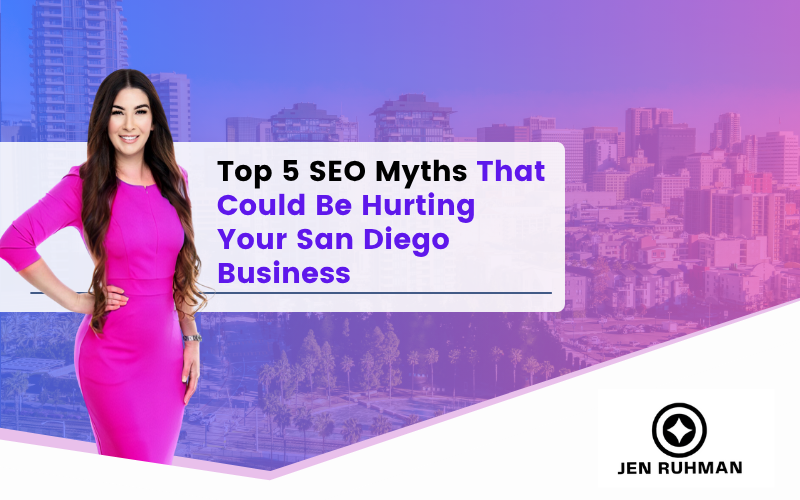Hey there, San Diego business owners! I’m Jen Ruhman, owner of your favorite SEO company in San Diego -jenruhman.com, and as someone who spends every day helping businesses rank better on Google, I know a thing or two about SEO. But let me tell you—there are a ton of myths floating around that could actually be hurting your online visibility. If you’ve been scratching your head wondering why your website isn’t ranking higher, it might be because you’re believing one of these common myths.

Let’s clear things up, shall we?
Myth #1: SEO Is a “Set-It-and-Forget-It” Task
Here’s something I often hear from my clients: “Jen, we optimized the website two years ago—aren’t we good to go?” Unfortunately, SEO isn’t like a crockpot dinner; you can’t just set it and walk away. The internet changes fast, Google updates its algorithm regularly, and your competitors never sleep.
Why Constant SEO Updates Matter
Your website needs consistent attention and updates. Think of SEO like tending a garden—regular watering and pruning help your website grow stronger over time. If you neglect it, weeds (your competitors) will take over your space. Regular content updates, technical checks, and keyword adjustments are essential for long-term growth.
Myth #2: Keywords Are All That Matters
Another common misconception I run into is that stuffing your content with keywords will shoot you straight to the top. I get it—keywords are super important. But guess what? They’re not everything.
Quality Content Is King
Google’s algorithms have evolved to understand context and user intent, not just keywords. So, when you’re creating content, write naturally and think about what your audience truly wants to know. For example, I had a client here in San Diego—a local restaurant—that focused heavily on keyword stuffing instead of genuine content. Once we shifted to writing engaging, helpful articles about their cuisine and local attractions, their organic traffic soared!
Myth #3: Social Media Has No Impact on SEO
Some businesses believe that social media and SEO are completely separate. But here’s the truth—your social media presence indirectly influences your SEO.
How Social Media Supports SEO
When you share your content on platforms like Facebook, Instagram, LinkedIn, or Pinterest, it helps drive traffic to your website. More traffic signals to Google that your website is valuable and relevant. Additionally, when your content is shared widely, it earns backlinks, further boosting your site’s authority.
One of my favorite examples is a San Diego clothing boutique I helped. After starting to actively promote their blog content through Instagram and Pinterest, their organic traffic increased significantly—and their rankings improved along with it.
Myth #4: Paid Ads Improve Organic Rankings
This myth is widespread. Many business owners believe if they spend money on Google Ads, their organic rankings will also improve automatically. The truth is, paid ads and organic rankings operate independently.
Organic and Paid: Two Different Worlds
Google clearly separates paid search results from organic ones. Buying ads won’t directly impact your organic ranking. However, paid ads can indirectly benefit your SEO efforts by increasing brand visibility, which might lead to more clicks, backlinks, and engagement. But there’s no direct correlation. Your organic SEO needs dedicated, strategic efforts independent of paid campaigns.
Myth #5: SEO Results Happen Overnight
When new clients come to me, they often expect immediate results. I understand—SEO takes time, and it can be frustrating when results don’t happen instantly.
SEO Is a Marathon, Not a Sprint
Think of SEO like training for a marathon. You wouldn’t expect to run 26 miles perfectly without months of consistent training, right? Similarly, SEO requires consistent, long-term effort. Typically, my San Diego clients start seeing significant improvements within 3-6 months. Patience and consistency really pay off here.
I had a client—a local plumber—who was initially skeptical when he didn’t see instant results. After four months of consistent content creation, optimizing his website, and link-building, he finally saw a dramatic uptick in traffic and leads. The long-term approach worked wonders!
How to Avoid Falling for SEO Myths
Now that we’ve busted these common myths, let’s quickly summarize how to stay on track:
Stay Educated
SEO is always evolving. Stay updated with trusted resources (like my blog, hint hint!). Understanding the basics can protect your business from falling into common traps.
Trust SEO Professionals
If you’re unsure, hire someone who knows what they’re doing. As a professional SEO consultant, I regularly attend training, read industry news, and stay ahead of changes. I’m always just a call or text away at (619) 719-1315.
Track Your Progress
Regularly monitor your website’s analytics. Tools like Google Analytics and Google Search Console help you understand your performance and adjust your strategies accordingly.
Wrapping It Up
SEO can be confusing, especially with so many myths flying around. But don’t worry! By debunking these myths and staying educated, you can ensure your San Diego business thrives online. Remember, SEO is about providing genuine value to your customers through strategic, ongoing efforts.
Got more questions or need expert help? Feel free to reach out anytime—I’d love to chat! Call/text me: (619) 719-1315.
FAQs
1. How often should I update my website for SEO?
Regular updates are essential. Aim for weekly or monthly updates, whether it’s new blog posts, refreshing old content, or technical improvements.
2. Does social media directly impact my website’s SEO ranking?
Not directly, but it significantly boosts your SEO by driving traffic and potentially earning backlinks, which helps improve your website’s authority.
3. Can paying for ads improve my website’s SEO?
No, paid ads don’t directly boost organic rankings, but they increase your brand visibility, indirectly helping your SEO by driving traffic.
4. How long does it usually take to see results from SEO?
Most of my clients start noticing improvements within 3-6 months. Consistency and patience are key.
5. Are keywords still relevant for SEO?
Absolutely! Keywords remain important, but using them naturally within quality content is essential for the best results.

